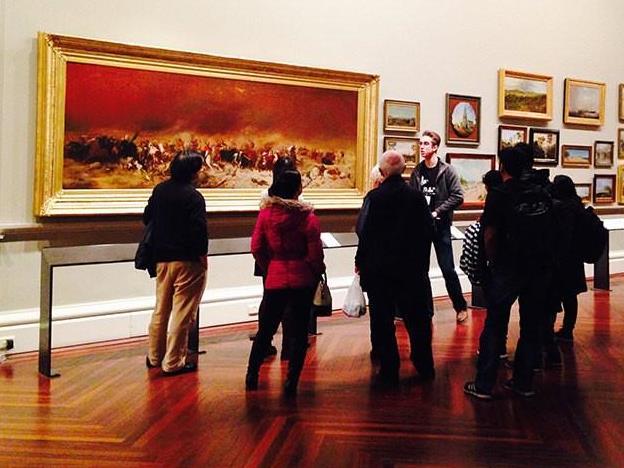A volunteer guide leads a tour at the State Library of Victoria.
The nature of the arts industry (notoriously underfunded and undervalued, but that’s another story) means that many people in the industry have volunteered at some point in their careers. Whether assisting at an arts festival, stuffing envelopes for a performance or as part of a formal internship, many arts organisations rely heavily on volunteers,.
When done intentionally and wisely, volunteering can help you stand out in a saturated job market. If an employer is faced with two nearly identical candidates, small details can work in your favour. Volunteer work is a great way to get that edge.
Stand out from the pack
If you are interested in making a career change or are just getting started in your arts career, then you may be faced with that old jobseeker conundrum: you need experience to get the job but you need the job to get experience. This is where volunteering can help boost your prospects. By gaining new skills in the right industry, getting in front of the right people and showing you care enough to work for free, you set yourself apart from all the other people looking to enter the sector.
People volunteer for a host of reasons, including personal satisfaction, a desire to give back to the community, and social contact. But while some people may be reticent to admit that their volunteer work is self-serving, the career benefits of volunteering are well documented. Brett Williamson, Volunteering Australia’s former chief executive, said there is emerging research that people earn brownie points by volunteering that help them advance their careers. ‘It’s not just about altruism,’ he said.
Lisa Jackson, an artist based in Brisbane, volunteered at various events and galleries while she was at art school. ‘I have gotten two paid jobs as a result of volunteering, one at a gallery and one assisting at an arts festival. Volunteering shows that you are enthusiastic about the role and helps build up your skills and experience,’ she explained.
‘It also means you are already in the minds of the people who are hiring, so they already know you and know that you can do that job, which makes you an ideal candidate,’ Jackson said.
Listing your volunteer experience on your CV can go a long way in catching the attention of recruiters, especially in a hotly contested field. Research by Deloittes found that including volunteering experience on a CV may make job candidates significantly more attractive to employers. In the Deloitte’s 2016 Impact Survey, respondents reported that they see volunteer experience listed on only 30% of the resumes they receive. At the same time, the majority (82%) of respondents said they would be more likely to choose a candidate with volunteer experience on their resume.
‘Volunteering within the arts industry kick-started my entire career,’ said Jordan Nix, partnerships coordinator at Perth’s Black Swan State Theatre Company. ‘I was a volunteer for just under a year and six months after finishing, I was offered a new paid role at Black Swan. That was six years ago and I’ve been very lucky since then to be able to work in multiple roles across Black Swan’s marketing, philanthropy and partnerships department. I am now Partnerships Coordinator and manage volunteers for our department. One of those volunteers recently became our new Marketing Coordinator so it’s a really nice circle.’
Be intentional
If you want to use volunteering as a way to build your career, be specific about what you would like to achieve. Volunteer for organisations that you would one day like to work for, even if they don’t have a formal volunteer program. Ask if you can help out at events, do office admin or assist with production. People working in your ideal organisation or field are also great sources of information on job openings, affinity organisations and people you should meet. And if you have a good experience volunteering, your supervisor might serve as a reference when you’re applying to jobs.
Many arts organisations are desperate for volunteers. According to Volunteering Australia, 86% of organisations which use volunteers need more people to help out, so don’t be afraid to ask. Organisations who use volunteers are interested in having a mutually beneficial relationship, so they want to use the volunteer’s skills while making sure that the volunteer is enjoying the process. Volunteering at events such as arts festivals and performances are a ton of fun, and often come with perks such as access to shows and events.
Read: Time management for portfolio careers
With volunteering, you get out what you put in. If you have any special skills or talents, such as photography or social media skills, then let the organisation know. They will want to get the most out of you, and by being proactive and showing initiative, you can develop your skills, show leadership and make an impact.
Volunteering can also be a great way to add projects to your folio. Lou Breford is a freelance graphic designer who wanted to make the switch from branding to editorial design, so she volunteered to design layouts for a local free press zine. She added the finished project to her online folio and used it to attract more editorial work her way.
“I didn’t have any paid experience in that area, but by volunteering my skills, I created something that I could then show prospective clients,’ she said.
Nix told Black Swan that he wanted writing experience, so they were able to accommodate his interest. ‘I wanted to gain on-the-job experience, but also expressed a strong interest in writing so Black Swan was able to shift the focus of my volunteering to allow me to contribute to programmes and newsletters.
‘I’d also say not to discount the more menial tasks you may have to do; simply by being in the office and around the action you will be developing relationships with important contacts and expanding your understanding of an arts organisation. When a new job does present itself, those are both major positives. My other piece of advice would be to stop and acknowledge the value of yours skills. Know when you have gotten all you need out of the volunteer opportunity or if the situation isn’t working for you.’
Career exploration
Volunteering allows a deep exploration of what it’s like to work in different workplaces. It can help you confirm what your dream job is or avoid wasting time on one that’s not right for you. You can get a glimpse of a different industry without the commitment of a paying gig or the risk of job-hopping.
‘Volunteering is a great idea,’ said Jessica Alice, program manager at Melbourne Writer’s Festival. She volunteered as an editor of several literary journals, before realising that editing wasn’t for her.
‘I was on the editorial committee for Voiceworks, plus edited for loads of journals, including Kill Your Darlings and The Lifted Brow. The nature of arts funding means that literary journals are mostly volunteer run. But I realised that actually I didn’t want to be an editor. I did know that I wanted to be in literature and the arts, but not as an editor. Volunteering allowed me to try different things.’
Formal volunteer programs such as internships offer an opportunity to gain concrete skills over a longer period of time, while volunteering can fit in around your current work or study schedule. ‘There is a lot more knowledge now about the ethics of volunteering, and most places offer a really good experience,’ said Alice. ‘Volunteering, as distinct from internships, offers more of a taster, where people can find out whether something interests them. It offers a behind the scenes look at the less glamourous parts of a role.’
Volunteering can also be a dry run for paid work. As Jackson put it: ‘If you are volunteering with an organisation that you would one day like to work for, then try to treat your volunteering role like a job interview. Do your best, don’t complain and try to be a helpful team member!’





